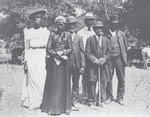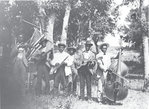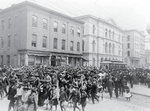


Over 150 years ago, the last slaves in the United States were freed, but that freedom came nearly two years after President Abraham Lincoln’s Emancipation Proclamation declared that “all persons held as slaves” in the rebellious states of the Confederacy were free. Those states were not under the control of the Union at the time, so it’s effect is often debated. Even after Confederate General Robert E. Lee surrendered at the Appomattox Court House in Virginia in April 1865, not all those who were enslaved knew they had their freedom.
On June 19, 1865, a regiment of Union soldiers, led by Major General Gordon Granger, landed in Galveston, TX to inform the people of Texas that those who were enslaved, approximately 250,000 in the state, were now free. There are many theories as to why it took so long for freedom to come to Texas. One thought is tthe slow rate that news traveled during the time and so it took two months for word of Lee’s surrender to get to Texas; but at the same time, many wonder why word of the Emancipation Proclamation, signed 30 months prior, never made it into the state. Some suggest that the delay was to allow slave owners to have one more cotton harvest before freeing the slaves. Some simply state that white supremacy had such a stronghold in the state, that the word was easily suppressed. Even with Granger’s announcement, there are reports that some slaves were not freed until 1868.
In his announcement, General Granger urged the slaves to stay with their respective plantation owners and negotiate wages. As most were not interested in remaining with the people who enslaved them, slaves began to leave the state to find family or other more welcoming areas outside the state, also known as “the scatter.” During that time, many former slaves were lynched, beaten, or murdered for trying to assert their freedom and leave their former masters, according to former slave accounts.
Former slaves and their descendants wanted to celebrate the date, named “Juneteenth,” as a way to celebrate their freedom and gather with remaining family members that survived. Many former slaves would make a pilgrimage to Galveston each year for the event. However, soon after the end of the Civil War, segregation laws were already being passed in states. In the 1870’s, a group of former slaves pooled their resources and purchased property in Houston, naming it Emancipation Park, so that Juneteenth celebrations could occur there. The park is the oldest park in Houston and in Texas, and until the 1950’s was the only public park and swimming pool African-Americans had access to.
Juneteenth celebrations declined during the Jim Crow era. With each proceeding generation, knowledge of Granger’s announcement in Galveston was supplanted by the Emancipation Proclamation as “freeing” slaves. In addition, during the Depression, many were forced to find work in urban areas where employers were less likely to grant time off to celebrate the day. It wasn’t until the Civil Rights Movement in the 1960’s that the holiday made a resurgence. Dr. Martin Luther King, Jr. planed the Poor People’s March in Washington, D.C. to coincide with the date. The event brought the holiday back into the consciousness of the community, with people beginning to create Juneteenth celebrations in their home states. Texas was the first state to recognized Juneteenth as a state holiday, though not all state offices close. Since then, 43 of the 50 U.S. states and Washington, D.C. have recognized Juneteenth as either a state holiday or ceremonial holiday. North Carolina passed the Act Recognizing Juneteenth National Freedom Davy in North Carolina in 2007.
The Chatham County Board of Commissioners passed a Resolution in Support of the Juneteenth Community Remembrance and Celebration on June 22, 2019 at the Chatham County Agriculture and Conference Center. The event is the second annual Juneteenth celebration organized by Chatham Organizing for Racial Equity (CORE) and the Chatham Community Library. Commissioner Jim Crawford, who holds a PhD in U.S. History from UNC-Chapel Hill and will be speaking at the Juneteenth event on “The Origins and Trajectory of Slavery in the US,” wrote, introduced, and made the motion to pass the resolution.
“In an era when one of our major political parties is seeking to capitalize on white identity grievances and daily exibits ill will against the larger American experiment, it is important to support Juneteenth and similar celebrations of the diversity that makes this nation strong,” Crawford said.
The resolution, which passed unanimously, resolved that the county “hereafter recognizes June 19th as Freedom Day, ‘Juneteenth,’ a date for reflection on the historical and ongoing struggle for equality and civil rights.”
“I love that in Chatham we are making strides in celebrating and honoring the valuable contributions of African Americans in this nation and learning our history is integral to that,” Commissioner Karen Howard said. “I am a firm believer that the better we know and understand our past the closer we will get to becoming the nation envisioned by our Founding Fathers.
“As an African American this day of observance is especially significant to me because in my experience the story of African Americans is often discussed and taught out of context, as though it is distinct from American History,” she continued. “It is in fact, a collective history and to have an opportunity to publicly recognize and share in the music, poetry, stories and lessons our forbearers in an informative, powerful way is a gift to us all.”
“I am delighted to support the Resolution to celebrate Juneteenth, a critical date that emancipated African-Americans from chattel slavery throughout America,” Commissioner Diana Hales. “We are fortunate that Chatham citizens have inaugurated an annual program to both focus on the history of slavery and the important contributions of African culture to this country.”
The Chatham County Juneteenth Celebration will be held from 11 a.m. to 6 p.m. on Saturday, June 22 at the Chatham Agricultural & Conference Center located at 1192 US-64 BUS in Pittsboro.
“Juneteenth increases understanding and unity concerning slavery and the historic efforts required to abolish it,” a release from the event reads. “It brings a strong sense of pride about the commitment that African Americans have made to the betterment of life for their children and grandchildren. The observance will also draw attention to modern-day slavery, such as unlawful child labor and human trafficking, and provide information on how we may work together as a community toward eliminating it.”
The celebration will feature informative talks by historians from three North Carolina universities.
• Dr. Charles Johnson of NC Central University will speak on “African Civilization Before Slavery”
• Chatham County Commissioner Dr. James Crawford will present on “The Origins and Trajectory of Slavery in the US”
• Dr. Arwin Smallwood of North Carolina A&T will discuss “Native Americans, Africans and Slavery in NC”
• Robin Cleary from NC Coalition Against Sexual Assault will discuss “Human Trafficking in a Historical Context.”
The event will also include performance artists, such as the Tryon Palace Jonkonnu Drummers and award-winning actor and author, Mitch Capel. These artists will be joined by poets, storytellers, musicians, and others whose work demonstrates the depth of the African American heritage and the wide range of important contributions that African Americans have made to the state and country.
Health screenings, information on nutrition, family fitness activities, displays and exhibits will be offered. Additionally, a “Child’s World” exhibit will provide learning experiences, crafts and storytelling specifically geared to younger audiences.
A variety of food trucks will be on site. The first 400 guests to arrive will receive a FREE $5.00 food truck coupon.
The event is free and open to the public and is made possible with funding from CORE and by the Friends of the Chatham Community Library.
For more information, please visit www.chathamlibraries.org or call the Library at (919) 545-8084.
Casey Mann can be reached at CaseyMann@Chathamnr.com.